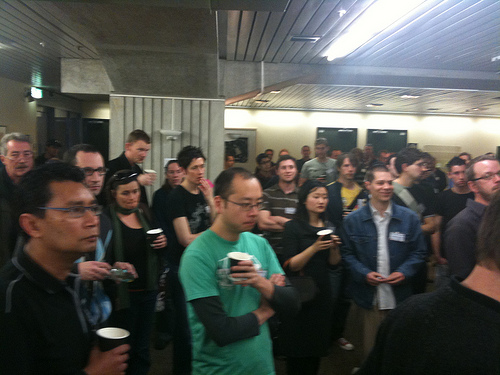]]>The search tool aims to help develop our services to researchers. It has a built-in survey and automatic collection of statistics to helpthe department find out what users think of it.The trial uses data from Archives New Zealand’s online search engine Archway, and also showcases digitised work from the New ZealandRead more about the trial and how to use it online at http://www.archives.govt.nz, and share your feedback with the department.
- the focus is on machine-readable information that is readily reusable. They don’t list PDFs, which is a wise move as data can’t readily be extracted from PDFs to be reused. They do list tables of data in HTML files, a decision that I don’t agree with but respect their right to make. The emphasis overall is on CSV, XML, and other open data formats, which is exactly where it should be.
- they take submissions from third parties. The big trap in government is to believe that everything must come from within. Our Open Data Catalogue showed that this is a great opportunity to crowdsource and they seized it.
- they take comments from users. Again, they’ve resisted the temptation to turn the official responsible for a dataset into the bottleneck for all information about that dataset. Instead the users of the dataset can help each other, ask questions of the creator, etc.
How well does the official portal do against Open New Zealand’s requirements?
- Collaborative: I believe that they aggregate from the Open New Zealand catalogue. ✔
- Open: They do not offer bulk download of their database yet. ✘
- Open Source: They’re built on open source, but their code is not itself open sourced (yet). ½✔
- Inclusive: I see statistical profiles of councils but it is listed as maintained by Internal Affairs. The proof of the pudding will be in the eating: do they accept submissions of CRI or open local body data? ?
- Conversational: They take and encourage comments. ✔
- Internally Useful: You can’t yet browse by agency or get a feed by agency. ✘
- RESTian: URLs are programmable, though not as hierarchical as we’d like (e.g., /dia/7). ½✔
- Extensible: It is not possible to add domain-specific metadata (e.g., geographic datasets have special needs). ✘
- Open standards based: They use CC licenses, but not standard dictionaries. On the plus side, it doesn’t use proprietary formats or protocols to restrict access. ½✔
Not bad for the first release. I think that this will be one of those “release early, release often” projects we’ve been saying that government should do more of. I believe that bulk download, geo-metadata, and open source are on the work program.
It’s clear that the work Open New Zealand did in preparing the requirements for data.govt.nz has paid off. Well done, everyone who participated in that. It’s a great example of government working with, not against, citizens.
]]> It’s all very well the well-intentioned agitators amongst us calling for “open government”, demanding “open data” and holding wacky barcamps and setting up wikis and blogs but what about those employed within the government agencies that sit upon the data (sorry, I mean lovingly hold the data for New Zealanders)?
It’s all very well the well-intentioned agitators amongst us calling for “open government”, demanding “open data” and holding wacky barcamps and setting up wikis and blogs but what about those employed within the government agencies that sit upon the data (sorry, I mean lovingly hold the data for New Zealanders)?
Without someone with both authority and mana to take the open government/open data message into the heart of bureaucracies that then it will be a long hard uphill road. But if you work within an agency how are you to know about the changing world, that the closed view on information is no longer the dominant one, or that you should be looking at giving it away instead of protecting it from all comers.
In a nutshell, you don’t know you can if you don’t know you can.
Vikram Kumar from the State Services Commission (SSC), those fine folks that recently unleased the draft New Zealand Government Open Access and Licensing framework (NZGOAL) (blog post), recently presented “Open Government/Open Data” (ppt) to “an audience of government’s recordkeepers” (link).
If you’re working with information/data held within a government agency and are looking for advice/guidance on any of the following, get in touch with Vikram and let him help you out with answering:
- What (and what not) data and information to set free?
- Why set it free?
- How do you set it free?
- What is “open data”?
- What is “open government”?
- What does this mean for OIAs?
Interested, check out the “Open Government/Open Data” presentation and the SSC: Open Government Information and Data Re-use Project information. And then get in touch with [email protected]
* Picture from http://www.flickr.com/photos/gettysgirl/3537413538/ under CC licence
]]>
- photo by Seradigm
An open government bar camp was held on August 29, as we’ve already mentioned. But what exactly did that mean?
It takes a special kind of person to voluntarily choose to sequester themselves in a bunker on a sunny Saturday to talk about government and data all day long. Luckily, Wellington is full of just that sort of people. They might look glum in the photo to the right, but that was mostly because the coffee was instant. Things lightened up after that. Somewhat.
So why did we do it?
As Brian from Silverstripe put it
Government agencies, as part of their work, collect a substantial amount of non-personal data – from geospatial and environmental data to statistics. In most cases public money is spent to research and obtain this data, so it should be accessible for everyone to use.
The people who attended Bar Camp were a mix of government and private sector workers. They came to explain themselves, or to demand answers from others. They also came to learn from one another, and to work together. What united us was wanting was find ways that we could open up more government data so that more could be made out of it.
What did we do?
It was nice to see vendors and government workers coming together with one goal in mind. Even though people had quite diferent perspectives at times, most drama was kept to a mimimum. The loose discussion style of bar camps can result in people going off on tangents, but for the most part we managed to avoid this.
Handily located in the Open Wiki is a list of all the sessions that took place over the day. Topics were suggested on the day, agreed on, and then attendees could wander around as they were interested. I started with why open is important, put out some suggestions for what Radio NZ could do to sort out its 4000 hours of content (I’m a big advocate for opening up tagging to users – or to put that in the language of the day “crowdsourcing a folksonomy) and just generally tried to remind people that although we weren’t necessarily very representative of the population as a whole (see also: spending Saturdays inside discussing government) perhaps instead of refering to what “people” want we could start by just building what we wanted.
The last session of the day took place in the auditorium was facilitated by Julian, who has written about it in more detail. People tweeted in their suggestions about what they wanted to see, such as:
- aggregate grants and scholarships available across govt
- public transport mashups (which bus takes least time)
- something with stats, like crime or benefits or unemployment – people love visualisations – graphs and maps, mmmm
- user research plan to identify data & tools to help elderly
- aggregate grants and scholarships available across govt
Naturally there were drinks after this. The next day people sat down and tried to deliver actual results at the hackfest, which I didn’t actually attend so I’m probably not the best person to write about it.
Julie Star wrote about her experience at Bar Camp for Idealog:
It’s all well and good posting PDFs and text files and a few spreadsheets in the depths of multiple websites, which various government agencies do now, but you often have to be a detective to find them and masochistically fond of manual processes if you want to extract just those bits of data that you’re interested in using elsewhere.
How will we go on from here?
Well, this is the big thing. We had lots of ideas and enthusiam, but unless we push, there aren’t going to be any results. This is where you come in. If you’re reading this, you’re now officially part of Open Govt. What do you want to see happen? And what skills do you have to lend to the cause?
]]>Interesting points with the LCDB:
- dataset is downloadable from Koordinates and [added 20090706, NJT] on physical media fro TerraLink International.
- the home page for LCDB links to its uses, which helps MfE establish how useful the open data is and to whom.
- MfE provide contact email address and documentation for the database. This documentation is static, and there is no forum or other community–an opportunity for the future.
Naturally, the Open Data Catalogue now has an entry for LCDB.
]]>